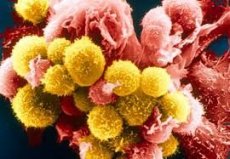Medical expert of the article
New publications
Lung malignancies may be dormant in the body
Last reviewed: 02.07.2025

All iLive content is medically reviewed or fact checked to ensure as much factual accuracy as possible.
We have strict sourcing guidelines and only link to reputable media sites, academic research institutions and, whenever possible, medically peer reviewed studies. Note that the numbers in parentheses ([1], [2], etc.) are clickable links to these studies.
If you feel that any of our content is inaccurate, out-of-date, or otherwise questionable, please select it and press Ctrl + Enter.

A recent study by specialists from Cancer Research UK has shown that cancer can be present in the body in a so-called "dormant" state. As it turned out, lung cancer with the first genetic malignant changes at the cellular level, which are provoked mainly by bad habits or polluted air, can not manifest itself for 20 years, and the disease cannot be diagnosed. But at a certain point, additional stimulation leads to aggressive growth of pathogenic cells and the development of a tumor.
Experts have also established that the changes that activate the pathological process at the gene level occur differently in different parts of the tumor. This, according to scientists, explains the genetic heterogeneity of the cancer process and the difficulties in treating the disease.
The authors of the scientific project conducted a thorough analysis of the genetic profiles of the cancer process in the lungs of a group of patients. The study participants were diagnosed with the most common form of the disease - non-small cell lung cancer, the project volunteers were current and former smokers, as well as people who had never smoked.
The specialists managed to completely decipher the genomes of different parts of the tumor, taking into account mutations in the cells (the scientists took into account changes in both all cells and in individual cells). As a result, this method allowed the scientists to recreate the development of the tumor, while determining changes throughout the entire stage of tumor growth (from beginning to end).
The scientists paid special attention to those patients who had smoked in the past, and as a result, the scientists found that the first changes in the lung cells occurred more than twenty years ago, at a time when the project participants were still smoking.
In addition, the analysis showed that genetic mutations in the tumor occur differently - in some areas, changes were detected that were completely absent in others. According to the researchers, such unevenness in changes leads to the fact that malignant lung tumors are extremely difficult to treat.
For example, chemotherapy chosen based on the results of a biopsy of one area of the tumor turns out to be completely ineffective for another area, and the tumor continues to grow with renewed vigor.
As a result of the study, experts concluded that it is extremely important to diagnose lung cancer in the early stages of the disease, before the tumor acquires genetic unevenness.
One of the effective methods of early diagnosis of lung cancer may be a blood test for tumor DNA. Such analysis has already been developed by some biotech companies. This type of diagnostics will allow to identify the process at an early stage, which is especially important for smokers, both current and former.
According to the World Health Organization, the world has the highest incidence and mortality rates from malignant lung tumors.

